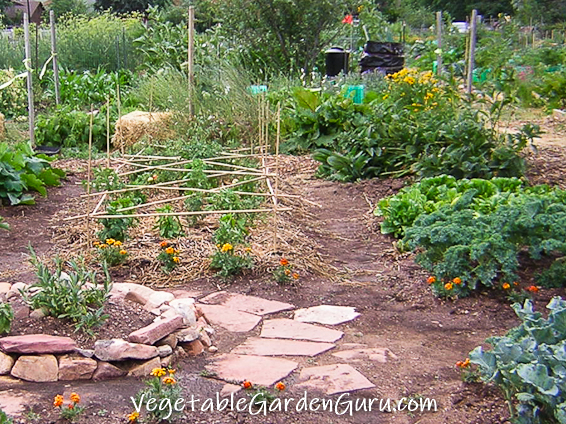| Back to Back Issues Page |
 |
|
Under the Arbor Issue 35 January 21, 2023 |
In This Issue:~ The Fallacy (and Facts) of Self-Sufficiency ~
Many people have heard stories of their great- or great-great grandparents who lived on the family farm, worked hard, and were "self-sufficient". My own former mom-in-law (whom I loved dearly), told me stories about her family's dryland wheat farm, with its kitchen garden, apple tree, and pigs. She told me about the fall slaughter, the stocked root-cellar, and how the "ditch rider" would come in for coffee when he was tending the irrigation ditch. The smokehouse preserved their meat for the "food gap" of winter on the eastern Colorado plains. With our current dependence on jobs, grocery stores, supply chains and big-oil/chemical agriculture, that image can hold a certain nostalgic and romantic appeal. It tells of strength, hard work, resilience, self-reliance, family teamwork and simple pleasures of life that refreshed the spirit rather than distracted the mind. (If we don't want to wake ourselves up from our fantasy, best not to think about what plowing the Great Plains did to bring about the Dust Bowl and the Great Depression…) But as to "self-sufficient" - well that all depends how you define it.
The FallacyNo one survives alone - if we examine life closely and honestly we will see that all life is connected. Our farming ancestors depended on each other, their plants and animals, and most were also dependent on the town store that bought their surplus and provided clothes, tools, sugar and more.Even modern-day, heavily-armed survivalists with three years of food in the basement and enough ammo to keep the smokehouse full, can't survive without the deer, the trees, the living soil, the rain. We can't survive into the future without other humans, either. (Who is your son or daughter going to marry?) Might as well admit it, we are not independent, we are interdependent, whether we want to admit it or not. Every living thing, including ourselves, is part of one web of life. Human and animal lives depend on plants (and/or other animals), which depend on soil bacteria, which depend on fungi, which depend on the bodies of decaying plants and animals. The sea depends on the nutrients that rivers and fish bring. Every seemingly-distinct ecosystem overlaps with other ecosystems at its boundaries, all of which together make up one massive, intricately-woven "being" of life. Zen monk Thich Naht Hanh called it "Interbeing". The FactsI heartily support every one of my readers in any efforts they can make toward growing more and more of their own food, whether or not the end of the world is in sight. Personally I believe that a lot of what is "wrong with the world" could be healed if we got out of each other's business and started paying more loving attention to the ecosystems that support us. Garden, dear readers, garden with your heart, and love on the bees, birds, worms and trees.I have a detailed article on the Vegetable Garden Guru website on Survival Gardening that lays out the basics for you. There is a lot more to think about though than just growing beans, squash and corn… (and tomatoes!). If you are seriously thinking about becoming more and more "self-sufficient", start building your skills now. Don't fall prey to the fantasy that by having a "seed vault" in your basement you're going to be able to "grow all your own food" if the sh*t hits the fan. If a crisis hits - war, drought, shortages, whatever - what you have on hand is not going to be as important as the skills you have mastered inside, including your psychological and spiritual skills. Do you remember all the fear and hype about "Y2K" back in December 1999? All the computers were supposedly going to crash because their internal clocks weren't programmed into the year 2000, and panic and shortages were going to unfold. I was living in a mobile home park, and my housemate was stocking up on canned food, fuel and water. Our mobile home park was filled with low-income people with lots of kids playing in the street, and I said, "What, are you going to be eating beans out of a can with the door locked, while the kids outside are starving?" Think about your fears. The worst fear most people have is of death (though #1 is actually public speaking!). Guess what, you are going to die, as am I, and while we may not want to think about it, none of us knows when. I could get smucked by a bus tomorrow. If you have a mortal fear of this (sorry, bad pun), start reading the spiritual classics of the world, of all the world. Live from a place of Love, not fear. If you stretch your mind to encompass more than you now understand it will help you embrace your whole life, the life of the whole world, the life of people who are different than you, and the life of all the animals, plants and creepy crawlies that make your life possible. It may even help you embrace your eventual death without fear. And speaking of Love over fear, I'll leave you with this:
Lechaim! (from Fiddler on the Roof)
DedicationVegetable Garden Guru is dedicated to the renewal of regenerative, sustainable, organic vegetable gardening around the world. May we become gardeners of healthful, nutrient-dense food, careful stewards of soil, and may the plants we tend remind us to always keep growing toward the Light.
|
| Back to Back Issues Page |

